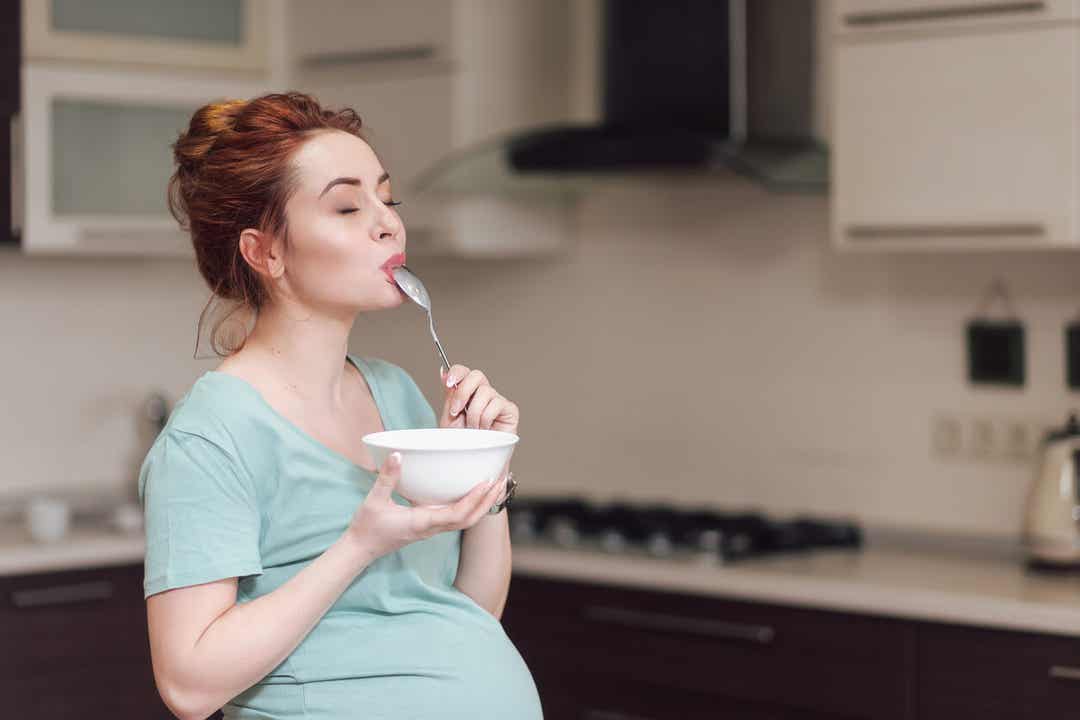Four Superfoods for Pregnant Women

During pregnancy, it’s crucial to take care of your diet. An error at this point can produce problems in the development of the fetus or the health of the mother, so it’s necessary to be meticulous and orderly. For this reason, we’re going to show you which are the superfoods for pregnant women.
Before we begin, it’s necessary to clarify that many nutrition experts don’t like the term superfood. This is because it makes people believe that these products have miraculous properties, when this isn’t the case. They’re simply foodstuffs that stand out for their functionality or for their content of essential nutrients.
Superfoods for pregnant women
Next, let’s talk about the main superfoods that can be included in the diet for pregnant women.
Yogurt

Yogurt is one of the must-haves in almost any diet. It concentrates high-quality proteins and essential micronutrients, such as vitamin D, inside. The latter, in conjunction with calcium, causes bones to be healthy and strong. So says a study published in the journal Frontiers of Hormone Research.
In addition, yogurts contain probiotic bacteria. These bacteria settle in the digestive tract, selectively colonizing it. They contribute to improving intestinal transit, avoiding constipation. Moreover, they’re able to stimulate the genesis of short-chain fatty acids, with anti-inflammatory potential.
Yogurt isn’t the only food that stands out for its probiotic content. It’s possible to find these microorganisms in other foods that have undergone a fermentation process, such as kefir.
Nuts and dried fruits
Nuts are foods with high energy and nutritional density. They contain proteins, high-quality fatty acids, and essential micronutrients. Among all these elements, it’s necessary to make special mention of the fatty acids of the omega 3 series.
These compounds are able to help maintain a balance in the internal environment, exerting an anti-inflammatory effect. In addition, these nutrients produce a more efficient development of the nervous system in the fetus, as evidenced by a publication in the journal Nutrients.
Legumes
Legumes provide a significant amount of fiber, which contributes to stimulating intestinal transit and avoiding constipation. They also contain essential micronutrients such as iron and folic acid. The latter is key during pregnancy, as a deficiency of it could cause problems in the closure of the neural tube.
However, it should be noted that legume proteins are of low biological value. They don’t contain all the essential amino acids and aren’t optimally digested. To overcome the limitations in terms of amino acids, experts recommend combining them with grains.
Oily fish
Oily fish stand out for their high biological value proteins and omega-3 fatty acids. Both nutrients are essential for both the mother and the fetus.

In addition, as they’re a type of seafood, they help to increase the presence of iodine in the diet. This mineral is key to the functioning of the thyroid gland. A drop in iodine levels in the body could aggravate hypothyroidism, affecting the mother’s well-being.
Including superfoods for pregnant women in your diet
If you’re pregnant, it’s important that you emphasize the presence of the foods we’ve just discussed in your diet. All of them will help to ensure proper fetal development as well as the maintenance of your health. However, if in spite of taking care of your diet, you feel excessively tired, don’t hesitate to contact a specialist.
You should also keep in mind that, during pregnancy, there are certain foods and substances that are important to avoid. Alcohol and tobacco are clear examples, but there are others such as coffee and cinnamon. In this regard, we recommend that you follow your doctor’s recommendations in order to avoid the intake of any product that could be counterproductive.
Finally, you shouldn’t forget that it’s important to promote the practice of physical activity during pregnancy. Exercise should be of low intensity and adapted to individual abilities, but in any case, avoid a sedentary lifestyle.
During pregnancy, it’s crucial to take care of your diet. An error at this point can produce problems in the development of the fetus or the health of the mother, so it’s necessary to be meticulous and orderly. For this reason, we’re going to show you which are the superfoods for pregnant women.
Before we begin, it’s necessary to clarify that many nutrition experts don’t like the term superfood. This is because it makes people believe that these products have miraculous properties, when this isn’t the case. They’re simply foodstuffs that stand out for their functionality or for their content of essential nutrients.
Superfoods for pregnant women
Next, let’s talk about the main superfoods that can be included in the diet for pregnant women.
Yogurt

Yogurt is one of the must-haves in almost any diet. It concentrates high-quality proteins and essential micronutrients, such as vitamin D, inside. The latter, in conjunction with calcium, causes bones to be healthy and strong. So says a study published in the journal Frontiers of Hormone Research.
In addition, yogurts contain probiotic bacteria. These bacteria settle in the digestive tract, selectively colonizing it. They contribute to improving intestinal transit, avoiding constipation. Moreover, they’re able to stimulate the genesis of short-chain fatty acids, with anti-inflammatory potential.
Yogurt isn’t the only food that stands out for its probiotic content. It’s possible to find these microorganisms in other foods that have undergone a fermentation process, such as kefir.
Nuts and dried fruits
Nuts are foods with high energy and nutritional density. They contain proteins, high-quality fatty acids, and essential micronutrients. Among all these elements, it’s necessary to make special mention of the fatty acids of the omega 3 series.
These compounds are able to help maintain a balance in the internal environment, exerting an anti-inflammatory effect. In addition, these nutrients produce a more efficient development of the nervous system in the fetus, as evidenced by a publication in the journal Nutrients.
Legumes
Legumes provide a significant amount of fiber, which contributes to stimulating intestinal transit and avoiding constipation. They also contain essential micronutrients such as iron and folic acid. The latter is key during pregnancy, as a deficiency of it could cause problems in the closure of the neural tube.
However, it should be noted that legume proteins are of low biological value. They don’t contain all the essential amino acids and aren’t optimally digested. To overcome the limitations in terms of amino acids, experts recommend combining them with grains.
Oily fish
Oily fish stand out for their high biological value proteins and omega-3 fatty acids. Both nutrients are essential for both the mother and the fetus.

In addition, as they’re a type of seafood, they help to increase the presence of iodine in the diet. This mineral is key to the functioning of the thyroid gland. A drop in iodine levels in the body could aggravate hypothyroidism, affecting the mother’s well-being.
Including superfoods for pregnant women in your diet
If you’re pregnant, it’s important that you emphasize the presence of the foods we’ve just discussed in your diet. All of them will help to ensure proper fetal development as well as the maintenance of your health. However, if in spite of taking care of your diet, you feel excessively tired, don’t hesitate to contact a specialist.
You should also keep in mind that, during pregnancy, there are certain foods and substances that are important to avoid. Alcohol and tobacco are clear examples, but there are others such as coffee and cinnamon. In this regard, we recommend that you follow your doctor’s recommendations in order to avoid the intake of any product that could be counterproductive.
Finally, you shouldn’t forget that it’s important to promote the practice of physical activity during pregnancy. Exercise should be of low intensity and adapted to individual abilities, but in any case, avoid a sedentary lifestyle.
All cited sources were thoroughly reviewed by our team to ensure their quality, reliability, currency, and validity. The bibliography of this article was considered reliable and of academic or scientific accuracy.
- Goltzman D, Mannstadt M, Marcocci C. Physiology of the Calcium-Parathyroid Hormone-Vitamin D Axis. Front Horm Res. 2018;50:1-13. doi: 10.1159/000486060. Epub 2018 Mar 29. PMID: 29597231. https://www.karger.com/Article/Abstract/486060
- Devarshi PP, Grant RW, Ikonte CJ, Hazels Mitmesser S. Maternal Omega-3 Nutrition, Placental Transfer and Fetal Brain Development in Gestational Diabetes and Preeclampsia. Nutrients. 2019 May 18;11(5):1107. doi: 10.3390/nu11051107. PMID: 31109059; PMCID: PMC6567027. https://www.mdpi.com/2072-6643/11/5/1107
This text is provided for informational purposes only and does not replace consultation with a professional. If in doubt, consult your specialist.








